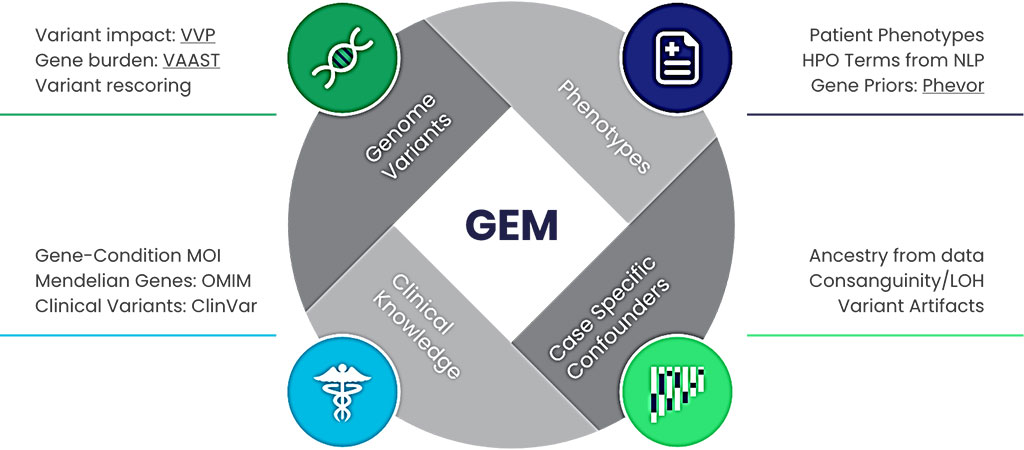AI-Based Technology Identifies Genetic Causes of Serious Diseases
By LabMedica International staff writers
Posted on 28 Oct 2021
Clinical interpretation of genetic variants in the context of the patient’s phenotype is becoming the largest component of cost and time expenditure for genome-based diagnosis of rare genetic diseases. Posted on 28 Oct 2021
The genome interpretation process consists of iterative variant filtering, coupled with evidence-based review of candidate disease-causing variants. Artificial intelligence (AI) holds promise to greatly simplify and speed genome interpretation by integrating predictive methods with the growing knowledge of genetic disease.

Image: Schematic Diagram of Fabric GEM workflow that provides fast, accurate results for any clinical NGS test (Photo courtesy of Fabric Genomics)
An international team of Genomic Medicine Scientists collaborating with those at the University of Utah School of Medicine (Salt Lake City, UT, USA) assessed the diagnostic performance of Fabric GEM (Fabric Genomics Inc., Oakland, CA, USA) a new, AI-based, clinical decision support tool for expediting genome interpretation. They benchmarked GEM in a retrospective cohort of 119 probands, mostly NICU infants, diagnosed with rare genetic diseases, who received whole-genome or whole-exome sequencing (WGS, WES). They replicated their analyses in a separate cohort of 60 cases collected from five academic medical centers. For comparison, they also analyzed these cases with current state-of-the-art variant prioritization tools.
The investigators reported that GEM ranked over 90% of the causal genes among the top or second candidate and prioritized for review a median of three candidate genes per case, using either manually curated or clinical natural language processing (CNLP)-derived phenotype descriptions. Ranking of trios and duos was unchanged when analyzed as singletons. In 17 of 20 cases with diagnostic structural variants (SVs), GEM identified the causal SVs as the top candidate and in 19/20 within the top five, irrespective of whether SV calls were provided or inferred ab initio by GEM using its own internal SV detection algorithm. GEM showed similar performance in absence of parental genotypes. Analysis of 14 previously unsolved cases resulted in a novel finding for one case, candidates ultimately not advanced upon manual review for three cases, and no new findings for 10 cases.
Mark Yandell, PhD, a professor of human genetics and co-corresponding author on the study, said, “Critically ill children rapidly accumulate many pages of clinical notes. The need for physicians to manually review and summarize note contents as part of the diagnostic process is a massive time sink. The ability of Clinithink’s tool to automatically convert the contents of these notes in seconds for consumption by GEM is critical for speed and scalability.” Clinithink (Alpharetta, GA, USA) is a technology company built around CLiX, the world’s first Healthcare AI capable of truly understanding unstructured medical notes.
The authors concluded that GEM enabled diagnostic interpretation inclusive of all variant types through automated nomination of a very short list of candidate genes and disorders for final review and reporting. In combination with deep phenotyping by CNLP, GEM enables substantial automation of genetic disease diagnosis, potentially decreasing cost and expediting case review. The study was published on October 14, 2021 in the journal Genomic Medicine.
Related Links:
University of Utah
Fabric Genomics Inc
Clinithink














